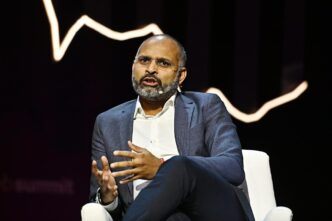The UK’s Advanced Research and Invention Agency (ARIA) hosted its first summit in London this week—and it didn’t hold back on ambition. Unlike the typical cautious tone of British research gatherings, this event leaned hard into techno-optimism. Attendees were challenged to ask: What could you work on that might truly change the world?
The response was electrifying. From lunar material engineers to neurotechnology success stories and transplant surgery visionaries, the stage was filled with pioneers. In the audience: startup founders, researchers, government advisors, and investors—all unified by a rare sense of momentum. According to ARIA’s American CEO Ilan Gur and British chair Matt Clifford, this energy isn’t just for show. It signals that one of ARIA’s biggest goals is working: attracting the world’s most ambitious minds.
Of the agency’s eight new programme directors, most hail from institutions like CERN and Stanford, not from within the UK. That, say Gur and Clifford, is a feature—not a flaw. ARIA wants to be a global magnet for frontier science. At the summit’s evening drinks, the American and British accents blended seamlessly, reflecting how international this deeptech wave has become.
Even former DARPA director Arati Prabhakar took note. Finding people who dream big, she said, is the hard part. But in the UK, it’s now possible—and necessary. Deeptech investor Seth Bannon echoed that feeling, calling Britain “a spring wound tight, ready to be unleashed.” With four of the world’s top research universities, the UK has the academic firepower. What it’s been missing, until now, is this kind of unapologetic ambition.
Why the Stakes Are High and the Timing Even Higher
Beyond inspiration, the summit also served as a wake-up call. As the U.S. government faces growing scrutiny for rolling back academic freedoms, Europe and the UK suddenly have a window of opportunity. If they can fund innovation, they can lead it.
ARIA received £800m in public funding in 2023 to fund its first five years. Half of that is already committed. With a spending review looming in June, the pressure is on for the UK government to keep backing ARIA’s high-risk, high-reward bets. Tech minister Peter Kyle made his stance clear: innovation funding is a priority. Despite cuts elsewhere, the R&D budget got an 8.5% increase last round—a promising sign.
Kyle also showed a willingness to take heat for bold ideas. He shared how one of ARIA’s early proposals involved geoengineering—specifically, reflecting sunlight to cool the Earth. Advisors told him to distance himself from it. He declined. “We’re doing high-concept work,” he said. “That’s the hallmark of a government doing serious things.”
This isn’t just policy talk. It’s about unleashing UK deeptech innovation before the moment slips away. As Hampus Jakobsson put it, “If you could steal the world’s best talent, wouldn’t that be worth infinite amounts of capital?”
ARIA’s bet is that the answer is yes—and that the UK is finally ready to lead the future, not just talk about it.











